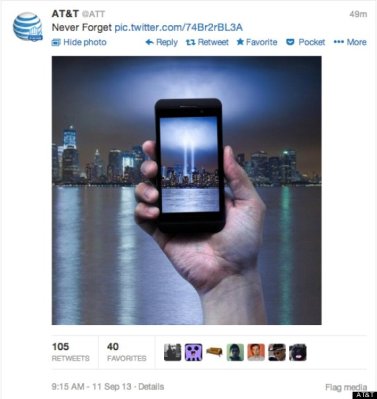Alright, brands. I know you’ve been training for Super Bowl Sunday ever since Oreo changed the marketing game with their brilliant tweet about a power outage during last year’s matchup. You were probably further galvanized by Arby’s rather clever joke poking fun at Pharrell’s hat during the Grammys. You have a team of social media mavens and PR specialists who will be hunkered down in your “war room,” with one eye on the game and the other on TweetDeck as you try to figure out just the right moment to send the legendary tweet that everyone will retweet thousands of times and talk about more than the $4 million commercials on Monday morning.
Fine. You have to do your job. But please, for the sake of the Twitterverse, think before you begin spamming our timelines with inappropriate jokes, stupid memes and desperate pleas for attention . A brand that barges in on a Twitter conversation at the wrong time is kind of like a parental chaperone that decides to bust a move at a middle school dance. It’s unnatural.
If you insist on proving that you “get” real-time marketing, Millennials and other awful buzzwords, at least follow these 5 rules to avoid having the snarky wrath of the Twitterverse rain down upon you.
1. Only Speak When Spoken To
.@Walmart no brands NO
— Jessica Roy (@JessicaKRoy) December 3, 2013
We are not friends, brands. If I don’t invite you into a conversation, don’t start @replying me like we’re bosom buddies who always talk about George Foreman grills together. Even if I mention your product, chances are I don’t want to have a discussion with a sentient form of Hot Pockets. There was a time when I could be excited by the idea of a carbonated drink interacting with me via social media, but that was before every other tweet was a marketing message. After I’ve directly engaged you, then sure, we can whisper sweet 140-character nothings to each other throughout the game. Otherwise, leave me alone.
2. Don’t Send that Sexist/Racist Tweet You’re Planning
Looks like algebra came in handy after all. #CCcream #PrettySmart pic.twitter.com/NN8JquTjRx
— Olay Skin Care (@OlayUS) October 24, 2013
You just want to make me smile. I get it. But before you send out that hilarious tweet for the entire world to see, ask yourself these questions, brand: what would a person from a different background from me think of this? Like a woman, perhaps, or a minority? How might their life experiences cause them to perceive this tweet differently than I do? What is the worst possible message someone could take from this off-the-cuff joke? Twitter just got a lady fired for tweeting a racially charged joke, if you recall. Don’t let yourself get caught in a feeding frenzy.
3. Stop Thinking Everything Is a Meme
.@pharrellhat how embarrasing we’re wearing the same thing. #twinsies #mountie #MusicToYourNose pic.twitter.com/x2id16ndNR
— Gain Laundry (@Gain) January 27, 2014
Sometimes brands are like Pinocchio, desperate to transform into real people and feel the incredible range of human emotions. That’s all Gain wanted here—to be a real boy, to laugh and to love and to wear a goofy cowboy hat like Pharrell. But Gain is laundry detergent, and laundry detergent should never wear clothes. We’ve reached a point in society where this basic fact has to be explained now. Leave the memes to the professionals, brands.
4. Don’t Leverage Horrible Things for Your Own Gain
Is September 11 really the day to be promoting your cell phone service? Is the anniversary of Pearl Harbor the time to remind everyone how awesome SpaghettiOs are? Super Bowl Sunday won’t be as somber as those dates, but past experience indicates that brands won’t be able to help themselves during serious moments. If there’s a gruesome injury or some other unforseen negative event during the game, your best bet is to stay quiet. No one wants to have a moment of worry or reflection interrupted by a Popchips pun.
5. Don’t Be a Hater
Here’s the original Yahoo Gmail tweet. Informative you might say. Mayer is not amused https://t.co/h1JRgRD3Or pic.twitter.com/Lxxib0uAlv
— Tom Warren (@tomwarren) January 24, 2014
You want to start “throwing shade,” as the kids say. This will make your brand edgy and spark lots of conversation, right? Actually, it’ll probably just make you look petty and remind people of the flaws in your own company. Yahoo tried to get a little cute last week when it tweeted that Gmail was down briefly, a clear potshot at Google’s troubles. Twitter users quickly pointed out that Yahoo’s own email service had been down for about a million users for days in December. Yahoo was forced to apologize for the childish tweet, proving that no one likes a brand that’s a tattle-tale.
Know this, brands: you’re playing a dangerous game here. Twitter can be a cruel place, and its users will no doubt prey on the companies that tweet foolishly. A single mistake can have permanent effects—even if you delete a stupid tweet in seconds, a thousand screenshots will already have been snapped.
You’ve been warned.


